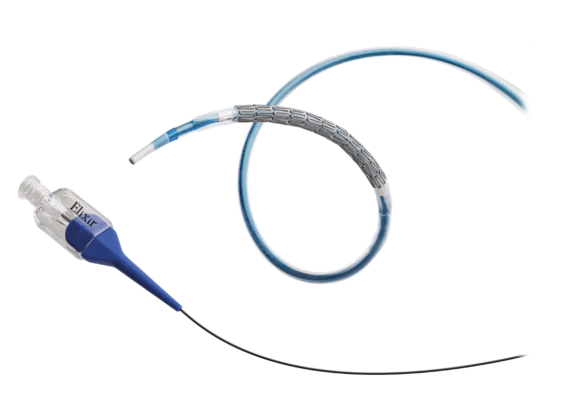
June 3, 2024 — Elixir Medical, a developer of transformative technologies to treat cardiovascular and peripheral disease, today announced significant positive 12-month clinical data from the DESyne BDS Plus Randomized Controlled Trial (RCT) evaluating DESyne BDS Plus, the world’s first triple drug-eluting coronary implant with site-specific antithrombotic therapeutic (TRx) coating versus a contemporary, durable polymer drug-eluting stent (DES). The data demonstrated a statistically significant lower TLF rate with DESyne BDS Plus than contemporary DES. The data were presented at a late-breaking clinical session during the EuroPCR 2024 conference in Paris.
“The current standard of care of combining oral antithrombotic therapies continues to pose serious challenges, especially in patients who are at high thrombotic risk and high bleeding risk, as managing the tradeoff between ischemic and bleeding risks is logistically unsustainable for healthcare providers and often results in delay of essential treatment decisions,” said Alexandre Abizaid, M.D., Ph.D., interventional cardiologist at Instituto do Coração (InCor) in Sao Paulo, Brazil. “These exciting results from the DESyne BDS Plus RCT demonstrate the sustained superiority in safety and efficacy of DESyne BDS Plus compared to a standard of care DES and underscore the potential for site-specific anti-thrombotic therapeutic (TRx) as a promising solution that effectively addresses the compromises we have to make between bleeding and thrombosis when using systemic drug therapies.”
12-month clinical results demonstrated safety and efficacy of DESyne BDS Plus:
- Significantly lower TLF rate of 2.1% for DESyne BDS Plus compared to 9.3% for contemporary DES, p=0.03.
- No definite or probable stent thrombosis, cardiovascular death, or target vessel myocardial infarction (TV-MI), were observed in DESyne BDS Plus treated patients
Previously presented data found that the study’s primary endpoint was met (pnon-inferiority<0.001); TLF at day three or at hospital discharge, whichever came first, which was 0.0% for DESyne BDS Plus treated patients versus 5.0% for patients treated with the contemporary durable polymer DES.
DESyne BDS Plus has a bioresorbable coating containing three drugs: two anticoagulants (rivaroxaban and argatroban) and an antiproliferative mTOR inhibitor (sirolimus) designed for delivery of site-specific antithrombotic therapeutic. The coronary implant with TRx therapeutic is designed to reduce thrombotic risk while eliminating the negative side effect of bleeding associated with oral anti-thrombotic use and to effectively help address the challenge of logistically managing ischemic and bleeding risk in at-risk PCI patient populations.
“We are thrilled with the statistically significant 12-month clinical outcomes of the TRx platform validating the improved safety and effectiveness of site-specific TRx therapeutic for coronary PCI treatment,” said Motasim Sirhan, CEO of Elixir Medical. “Site-specific antithrombotic therapy can be a more effective approach to addressing ischemic risk without the risk and complications of bleeding associated with oral anti-thrombotics.”
Coronary artery disease is the leading cause of death for men and women in most racial and ethnic groups in the U.S.1 While PCI has positively impacted mortality rates,2 procedure and device related risks remain. Stent thrombosis after PCI is associated with large territory myocardial infarction (MI) events and poor outcomes, with death rates as high as 50% for early (<30 days) thrombosis cases.3 Management of ischemic and thrombotic risk requires medication adherence, but only 60% of patients are adherent to their prescribed cardiovascular medications which can lead to an increased risk of cardiovascular events or mortality by 20% or 35%, respectively.4 In addition, 3.5% of patients undergo non-cardiac surgery within six months of PCI procedure requiring careful management of thrombotic and bleeding risk by healthcare providers.5
About the DESyne BDS Trial
The DESyne BDS Plus Randomized Clinical Trial (RCT) is a prospective, multicenter, single-blind study evaluating the safety, effectiveness, and performance of the DESyne BDS Plus Triple Drug-Eluting Coronary Implant compared to DESyne X2 Drug-Eluting Coronary Stent System in the treatment of de novo native coronary artery lesions. The trial includes 202 patients across 14 sites in Europe, New Zealand, and Brazil. An imaging subset of 58 patients had angiographic and optical coherence tomography (OCT) assessment completed in the first six months. Data collection will continue through three years.
About TRx
TRx is the world’s first triple-drug site-specific antithrombotic therapeutic using two anticoagulants (rivaroxaban and argatroban) and an antiproliferative mTOR inhibitor, sirolimus. The therapy was designed to address challenges associated with oral anti-thrombotics requiring a compromise between ischemic and bleeding risk, making it difficult and unsustainable for healthcare providers to manage patient needs.
For more information: www.elixirmedical.com
References:
- Heart Disease Facts | CdC.gov. (2023, May 15). Centers for Disease Control and Prevention. https://www.cdc.gov/heartdisease/facts.htm
- Liza Chacko, James P. Howard, Christopher Rajkumar, Alexandra N. Nowbar, Christopher Kane, Dina Mahdi, Michael Foley, Matthew Shun-Shin, Graham Cole, Sayan Sen, Rasha Al-Lamee, Darrel P. Francis and Yousif Ahmad, Effects of Percutaneous Coronary Intervention on Death and Myocardial Infarction Stratified by Stable and Unstable Coronary Artery Disease: A Meta-Analysis of Randomized Controlled Trials, Cardiovascular Quality and Outcomes. 2020 https://www.ahajournals.org/doi/10.1161/CIRCOUTCOMES.119.006363
- Lawton et al. 2021 ACC/AHA/SCAI Coronary Revascularization Guideline.
- Chen Chen, MD, 1 Xiaoqing Li, MD, 1 Yuhao Su, MD, 1 Zhigang You, MD, PhD, 1 Rong Wan, PhD, 2 and Kui Hong, MD, PhD. Adherence with cardiovascular medications and the outcomes in patients with coronary arterial disease: “Real‐world” evidence. Clinical Cardiology. September 18, 2022. https://pubmed.ncbi.nlm.nih.gov/36116032/
- Smilowitz et al. Risks of Non-Cardiac Surgery Early after Percutaneous Coronary Intervention. Am Heart J. 2019 November; 217: 64–71.


 May 30, 2024
May 30, 2024 




